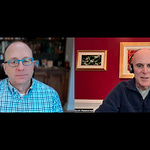In this Episode of the Brain Cancer Science Talk series, we speak with John de Groot, MD (Division Chief of Neuro-Oncology, UCSF; see here) about priority topics in brain cancer research and clinical practice. The conversation begins with a discussion of the role of immunotherapies in treating brain tumors, and some of the specific limitations that such approaches encounter. We emphasize the need for combination protocols over monotherapy approaches, given the heterogeneous, aggressive and invasive nature of many brain cancers as well as the high degree of immunosuppression found in the tumor microenvironment (TME). Methods for flipping the TME from immunologically “Cold” to “Hot” are addressed, including DNA Damage Response modifiers, loco-regional radiation therapies (RT) and other Directed Energy technologies.
Next, we consider the Blood Brain Barrier (BBB) and the unique challenges that it creates for the development of therapeutic agents for brain cancer (see here for a recent review from Dr. de Groot’s UCSF group). Dr. de Groot is an acknowledged leader in the advancement of Focused Ultrasound (FUS) methods for transiently opening the BBB to enhance drug delivery into various regions of the brain as well as to access tumor-associated molecular material for liquid biopsy. We continue with an overview of the need to upgrade clinical trial design to incorporate much more scientific rationale, and to attract more brain cancer patients as enrollees.
Finally, we ponder necessary improvements to the historical Regulatory framework to better enable the efficient conduct of the combination protocol designs that will be required to yield better treatment outcomes for heterogeneous brain cancers with aggressive clinical timelines.
Why aren’t Regulators allowing the use of external Control datasets based on previous rigorously-conducted trials instead of insisting on Yet Another Active SoC Control Arm for each trial, which chases away patients who do not want to risk being randomized to the SoC Control arm?

Dr. de Groot has been an invaluable resource for the entire MissionGBM family, and has been quick to see patients in his practice as well as do peer-to-peer consulting with other care teams. Some of the most challenging MissionGBM cases (e.g. Lynch Syndrome, other genetic anomalies) have been taken up by Dr. de Groot and his colleagues in the UCSF Division of Neuro-Oncology. We thank him for his leadership in the clinic and the lab.









